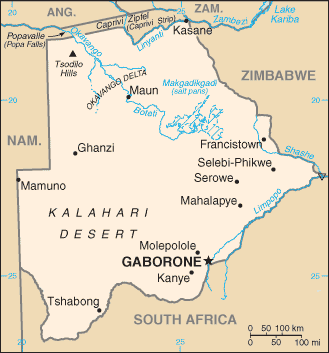Botswana

The Republic of Botswana has an estimated population of 1.9 million (UN, 2010). The capital is Gaborone. Botswana has an area of 581, 730 sq km (224,607 sq miles). The main languages are English (official), and Setswana.
Considered one of Africa's stable countries, Botswana became independent in 1966 from the British protectorate. Botswana is Africa's longest multi-party democracy. The country guarantees the protection of fundamental rights of the individual and has one of the best human rights records in Africa. As the world's largest producer of diamond, Botswana is relatively free of corruption. Important capital investment has created one of the most dynamic economies in Africa.
The government of Botswana specifically focuses on closing the gap in gender inequality. From the government to private sector, women can be found in all sectors of society where they hold leadership and decision-making positions. According to the UNDP, Botswana is ranked 49th of about 150 countries on its gender empowerment measures. Despite the Government efforts to improve gender equality, strong societal perceptions continue to hamper equal rights for men and women.
- Botswana has neither signed nor ratified the Protocol to the African Charter on Human and Peoples' Rights on the Rights of Women in Africa (The Maputo Protocol).
- The Convention on the Elimination of All Forms of Discrimination against Women (CEDAW) was ratified by Botswana on the 13th of August 1996.
- Botswana has not yet adopted a National Action Plan on United Nations Security Council Resolution 1325 (UNSCR 1325).
- There are no current or former UN peacekeeping mandates in Botswana.
Source:BBC, AlertNet, CIA, UN, SIGI
